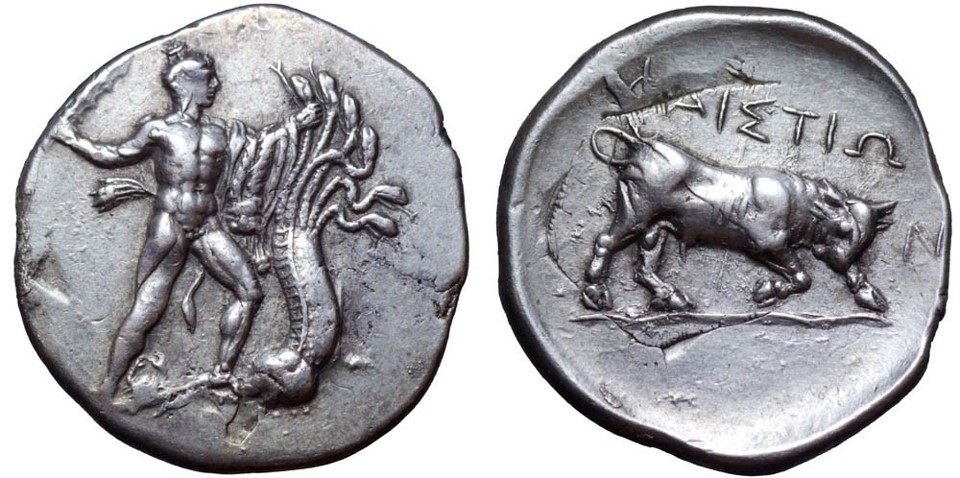320 BCE - 300 BCE | ΦΑΙΣΤΙΩΝ
Overstriking coin
Phaestus_over_Corinth_Roma_Numismatics_Ltd, _Auction_XI, _7_April_2016, _lot_290.jpg
[1]
Overstruck variety
Aegina 5 parts.jpg
|
|
Sale(s)Sale(s) ᵖ:
|
Roma Numismatics, 11, 7 Apr. 2016, 290
|
|
|
|
Description
| ObverseInscription or printing placed on the obverse.:
|
Herakles facing, wearing Nemean lion skin, seizing with his left hand one of the heads of the Lernean Hydra, and with his right hand preparing to strike with club. By right foot.
|
ReverseInscription or printing placed on the reverse.:
|
ΦΑΙΣΤΙΩΝ (Greek) Bull charging right.
|
Mint and issuing power
| MintIdentifies the place of manufacture or issue of a numismatic object.:
|
Phaestus
|
Ancient regionAncient region.
|
Crete
|
Modern countryModern country: Crete
|
AuthorityIdentifies the issuing power. The authority can be "pretended" when the name or the portrait of X is on the coin but he/she was not the issuing power. It can also be "uncertain" when there is no mention of X on the coin but he/she was the issuing power according to the historical sources:
|
|
Chronology
| FromIdentifies the initial date in a range assigned in a numismatic context. 320 BCE toIdentifies the final date in a range assigned in a numismatic context.. 300 BCE
|
Hellenistic 323-30 BC  periodTime period of the numismatic object. periodTime period of the numismatic object.
|
Physical description
MetalThe physical material (usually metal) from which an object is made.: Silver 
|
WeightWeight of the numismatic object (in grams). in grams: 11.4711.47 g <br />11,470 mg <br />
|
DenominationTerm indicating the value of a numismatic object. Examples: tetradrachm, chalkous, denarius.: stater 
|
AxisDescribes the directional relationship between the obverse and reverse of a numismatic object.: 77 mm <br />0.7 cm <br />
|
| DiameterDescribes diameter of an object (in mm).: 2828 mm <br />2.8 cm <br />
|
StandardStandard.: Aeginetic
|
References
Description
| ObverseInscription or printing placed on the obverse.:
|
Turtle
|
ReverseInscription or printing placed on the reverse.:
|
Incuse square
|
Mint and issuing power
| MintIdentifies the place of manufacture or issue of a numismatic object. ᵖ:
|
Aegina
|
Ancient regionAncient region. ᵖ
|
Attica
|
Modern countryModern country: Greece
|
AuthorityIdentifies the authority in whose name (explicitly or implicitly) a numismatic object was issued. ᵖ:
|
|
Chronology
| FromIdentifies the initial date in a range assigned in a numismatic context. 400 BCE toIdentifies the final date in a range assigned in a numismatic context.. 330 BCE
|
Classical 480-323 BC  periodTime period of the numismatic object. periodTime period of the numismatic object.
|
Physical description
| DenominationTerm indicating the value of a numismatic object. Examples: tetradrachm, chalkous, denarius. ᵖ:
|
stater 
|
StandardStandard. ᵖ:
|
Aeginetic
|
References
References
- ^ Svoronos, Ioannes N. (1890), Numismatique de Crète ancienne, accompagnée de l'histoire, la géographie et la mythologie de l'île. Première partie, description des monnaies, 2 vol., Macon, Impr. Protat frères.
- ^ Le Rider, Georges (1966), Monnaies crétoises du Ve au Ier siècle av. J.-C., Paris, Geuthner, 345 p. and 42 pl.
- ^ Carbone, Federico (2022), Festos I. La moneta. produzione, seriazione e cronologia, Monografie della Scuola Archaeologica di Atene e delle missioni italiane in Oriente, Athens, 241 p.


